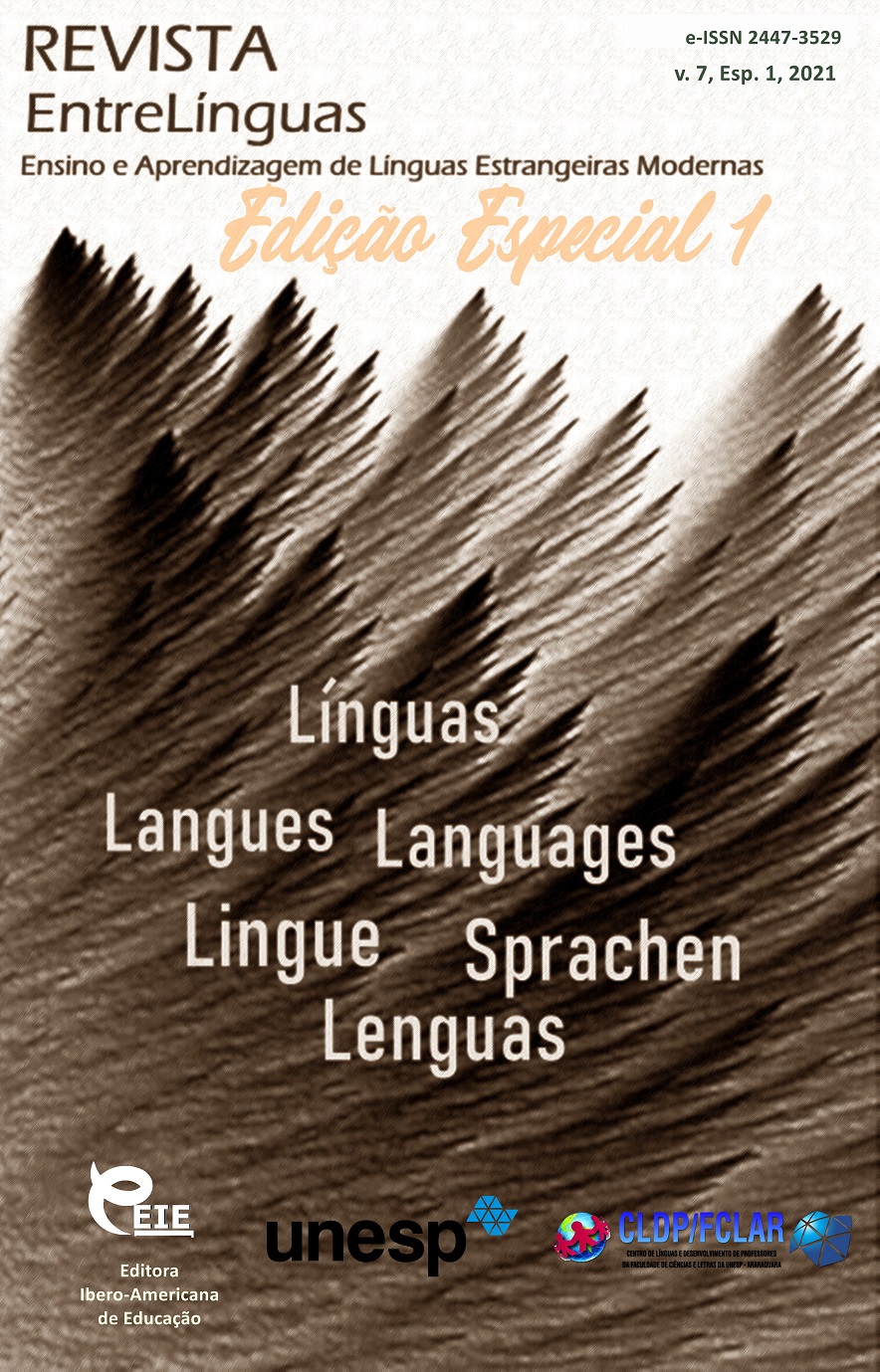Chuvash loan words in the dialects of the kreshin tatars
DOI:
https://doi.org/10.29051/el.v7iEsp1.14855Keywords:
Tatars, Chuvashes, Kreshin tatars, Dialects, Chuvash loansAbstract
The article is intended to show the relations between Tatar and Chuvash and to examine Chuvash loan words in the dialect of Kreshin Tatar, which is a specific group of Tatar people. Tatars and Chuvash, who have lived as neighbors for a long time, not only have economic and daily relations, but also a mutual language influence, as a result of which mutual loans are exchanged between them. The paper also approaches the tight links between the two peoples and some language relations. Chuvash loans are present in the various aspects of daily life of the dialect of Melki Kreshins, for example, tundi kĭn (Monday), utlari kĭn (Tuesday), kekey (meat), kukşa (skinhead), kırsut (house fairy), cĭkres (twin), çaplĭ (good, beautiful), etc. to be compared with their Chuvash parallels, in terms of usage features. In addition, the dresses of girls and women of Melki Kreshins, which are accepted as Chuvash dresses, but whose names are not taken from Chuvash, such as takıya (women's headdress, decorated with bright stones and scales, fez), tastar (hijab made of white linen weave), tastar yawligi (tastar hijab), kaşpaw (round cap decorated with scales that used to be worn by women), etc. which will be examined on the basis of their equivalent in Tatar, Chuvash and other dialects.
Downloads
References
ALKAYA, E.; KIRILLOVA, Z. Kreşin tatar türkçesi:(dil, tarih, kültür). Kesit, 2018.
AXMETYANOV, R. G. Sravnitelnoye islledovaniye tatarskogo i chuvashskogo yazikov (fonetika i leksika). Moskva: Nauka, 1978.
BAYAZITOVA, F. S. Keräşennär. Tel üzençälekläre häm yola icatı. Kazan: Matbuğat yortı, 1997.
EXMETYANOV, R. G. Tatar teleneng etimologik süzlege. Kazan: Megarif – Vakıt, 2015. v. I-II, 543 p.
GULER, O.; KIRILLOVA, Z. N.; SAHIN, L. Lexical features of christian tatar subdialects. Amazonia Investiga, v. 7, n. 15, p. 185-189, 2018.
GULER, O.; KIRILLOVA, Z.; SAHIN, L. Language Features of Books for Christian Tatars and Karaman Turks. Revista Genero & Direito, João Pessoa, v. 8, n. 7, p. 421-428, 2019. DOI: https://doi.org/10.22478/ufpb.2179-7137.2019v8n7.50046
ISTORIYA, I. TATAR-KRYASHEN, K. (XVI-XX vv.): Kollektivnaya Monografiya. Kazan, Institut Istorii im, 2017. 960 p.
KIRILLOVA, Z. N.; KALGANOVA, G. F. Continuous Education in the Tatar Language: History and the Present. The European Proceedings of Social & Behavioural Sciences, v. 45, p. 554-562, 2018.
SIBGAEVA, F. R.; SALAKHOVA, R. R.; HUSEYNOVA, M. N. Structural and word-formative features of verbs of behavior in the tatar language. Revista Genero & Direito, v. 8, n. 7, p. 39-48, 2019.
YERBULATOVA, I. K.; KIRILLOVA, Z. N.; SAHIN, L. National and cultural realias of translations into tatar. Humanities & Social Sciences Reviews, v. 7, n. 6, p. 984-987, 2019.
Downloads
Published
How to Cite
Issue
Section
License

This work is licensed under a Creative Commons Attribution-NonCommercial-ShareAlike 4.0 International License.
Os manuscritos aceitos e publicados são de propriedade da Revista EntreLínguas. Os artigos publicados e as referências citadas na Revista EntreLínguas são de inteira responsabilidade de seus autores.
Transferência de direitos autorais – autorização para publicação
Caso o artigo submetido seja aprovado para publicação, já fica acordado que o(s) autor(es) autoriza(m) a UNESP a reproduzi-lo e publicá-lo na EntreLínguas, entendendo-se os termos “reprodução” e “publicação” conforme definição respectivamente dos incisos VI e I do artigo 5° da Lei 9610/98. O artigo poderá ser acessado pela rede mundial de computadores (Internet), sendo permitidas, a título gratuito, a consulta e a reprodução de exemplar do artigo para uso próprio de quem a consulta, desde que haja a citação ao texto consultado. Essa autorização de publicação 328 EntreLínguas, Araraquara, v. 1, n .2, p. 323-328, jul./dez. 2015 não tem limitação de tempo, ficando a UNESP responsável pela manutenção da identificação do(s) autor(es) do artigo. Os artigos publicados e as referências citadas na Revista EntreLínguas são de inteira responsabilidade de seus autores.











